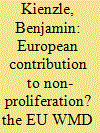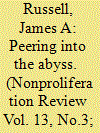| Srl | Item |
| 1 |
ID:
123885


|
|
|
|
|
| Publication |
2013.
|
| Summary/Abstract |
In the aftermath of the ruptures caused by the Iraq crisis, European states agreed in December 2003 on both a European Security Strategy and an EU Strategy against the Proliferation of Weapons of Mass Destruction (WMD).
Ten years have passed since this attempt to kick-start common European policies on WMD proliferation. How well have EU policies performed in this area? Has a specifically European way of dealing with proliferation challenges emerged?
This article traces the development of EU policies on WMD proliferation since 2003 by examining, in particular, European reactions to the nuclear crisis in Iran, as well as European interactions with the international non-proliferation regime and the cooperation with partner countries. The article concludes that the EU has performed much better than might have been expected in an area that has traditionally been one of the fiercely guarded prerogatives of national security policies.
The EU's good performance is very much related to institutional flexibility, as exemplified by the EU/E3 approach to Iran, and to a high degree of political pragmatism. However, important shortcomings remain, most notably the lack of coordination between national and European non-proliferation efforts. In other words, the EU has not in the last 10 years turned into a fully fledged non-proliferation actor that can deliver tangible results in any area of proliferation concern.
|
|
|
|
|
|
|
|
|
|
|
|
|
|
|
|
| 2 |
ID:
114378


|
|
|
| 3 |
ID:
076724


|
|
|
|
|
| Publication |
2006.
|
| Summary/Abstract |
The George W. Bush administration has successfully reoriented national policy and convinced the international community of the absolute necessity of denying weapons of mass destruction to terrorist groups. In addition to utilizing the tools of existing export control regimes, Washington promulgated the Proliferation Security Initiative and helped push through United Nations Security Council Resolution 1540 to expand the toolkit available to states to prevent the spread of dangerous technologies and weapons to terrorist groups. While these efforts are long overdue, they address only one aspect of the proliferation threat posed by non-state actors. Current efforts focus on the "demand" side of proliferation from terrorists but inexplicably leave unaddressed the role that a growing variety of non-state actors may play in shaping the supply side of an emerging 2016 proliferation market substructure. The proliferation supply network established by Pakistani scientist A. Q. Khan provides a precursor to a dangerous new proliferation environment dominated by transnational corporations, quasi-governmental entities, and individuals operating on the fringes of government control in weak or failing states that lack the will and the resources to implement effective export-control regimes. All states need to develop a more comprehensive and holistic view of the future role that a burgeoning plethora of non-state actors will play in nuclear proliferation by 2016.
|
|
|
|
|
|
|
|
|
|
|
|
|
|
|
|
| 4 |
ID:
182419


|
|
|
|
|
| Summary/Abstract |
North Korea frequently uses diplomatic missions, diplomats and intelligence officers in its Weapons of Mass Destruction (WMD) proliferation and arms trafficking networks. The paper places the use of these assets in historical context, provides a basic typology of their role, and considers why they have featured in North Korea’s networks. The paper identifies a number of trends surrounding the use of North Korean missions – including the types and locations of missions featuring in specific types of proliferation and arms dealing activities, the prominence of larger missions and use of third country and regional hubs. It argues that the persistence of these assets in the DPRK’s networks is largely a result of convenience and diplomatic immunity. The paper concludes by recommending further action to counter these assets while arguing that the phenomenon will continue to be a challenging feature of North Korea’s proliferation and arms trading activities.
|
|
|
|
|
|
|
|
|
|
|
|
|
|
|
|